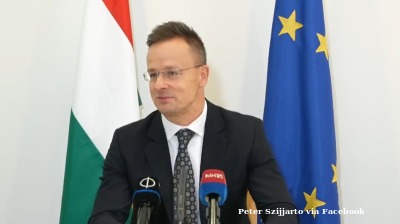The United States has issued a warning to Serbian banks over potential violations of sanctions targeting Serbia’s oil company NIS, President Aleksandar Vucic said on October 17.
Speaking on Pink television, Vucic said the National Bank of Serbia (NBS) had received a formal notice from US authorities, highlighting concerns about the use of the domestic DinaCard payment system at NIS fuel stations, which could be interpreted as a breach of US sanctions.
US sanctions on NIS came into effect on October 9, after months of delays and temporary waivers. The measures prohibit transactions with NIS involving US-linked financial instruments, including payments using Visa, Mastercard and other foreign-issued cards.
With the enforcement now active, fuel purchases at NIS stations must be made in cash or via the DinaCard — Serbia’s national payment card introduced in 2003 through a partnership between the NBS and local commercial banks.
Vucic emphasised that there were no disruptions in fuel supply and urged citizens not to panic. “The market will be well supplied. Diesel prices have even decreased today,” he said. “We are doing everything we can in terms of oil, gas, and electricity. There’s no reason for concern about heating or energy supplies.”
While cash remains the predominant payment method in Serbia, the warning from Washington suggests that US authorities may scrutinise the use of the DinaCard system as a possible workaround to sanctions targeting Russian-linked entities.
Vucic said Serbia would engage in talks with the US to resolve the issue. “We will not go back to the past. We are going to the future,” he said.
NIS, Serbia’s largest oil company, is majority-owned by Russian energy giant Gazprom via its subsidiaries Gazprom Neft and Intelligence, making it a target of Western sanctions.
The latest developments raise concerns over potential economic fallout, especially in Serbia’s energy and banking sectors, as the country continues to balance its traditional ties with Russia and its ambitions for closer integration with the European Union.
News
_Foto2_Divulgação_Foresea_(1)_1761062969.jpg)
Petrobras secures controversial Amazon drilling licence ahead of COP30 climate summit
Brazil's Petrobras has obtained authorisation to drill an exploratory well near the mouth of the Amazon River, sparking fierce criticism from conservationists just weeks before Brazil hosts UN climate talks.
_1761050969.jpg)
Revolut clears final hurdle for Mexico banking debut
Revolut has received final authorisation from Mexico's banking regulator to commence operations, positioning the London-based fintech to launch services within weeks.

Hungary to challenge EU’s ban on Russian gas imports, vows to block REPowerEU
Hungarian Foreign Minister Peter Szijjarto says the European Council’s decision to ban Russian fossil fuel imports by 2027 could jeopardise Hungary’s energy security.

Slovak Foreign Minister Blanár reiterates support for Ukraine’s EU bid
Juraj Blanár says Ukraine is "ready in a way" for accession, but notes objections from some EU member states.



_2_1761012864.jpg)